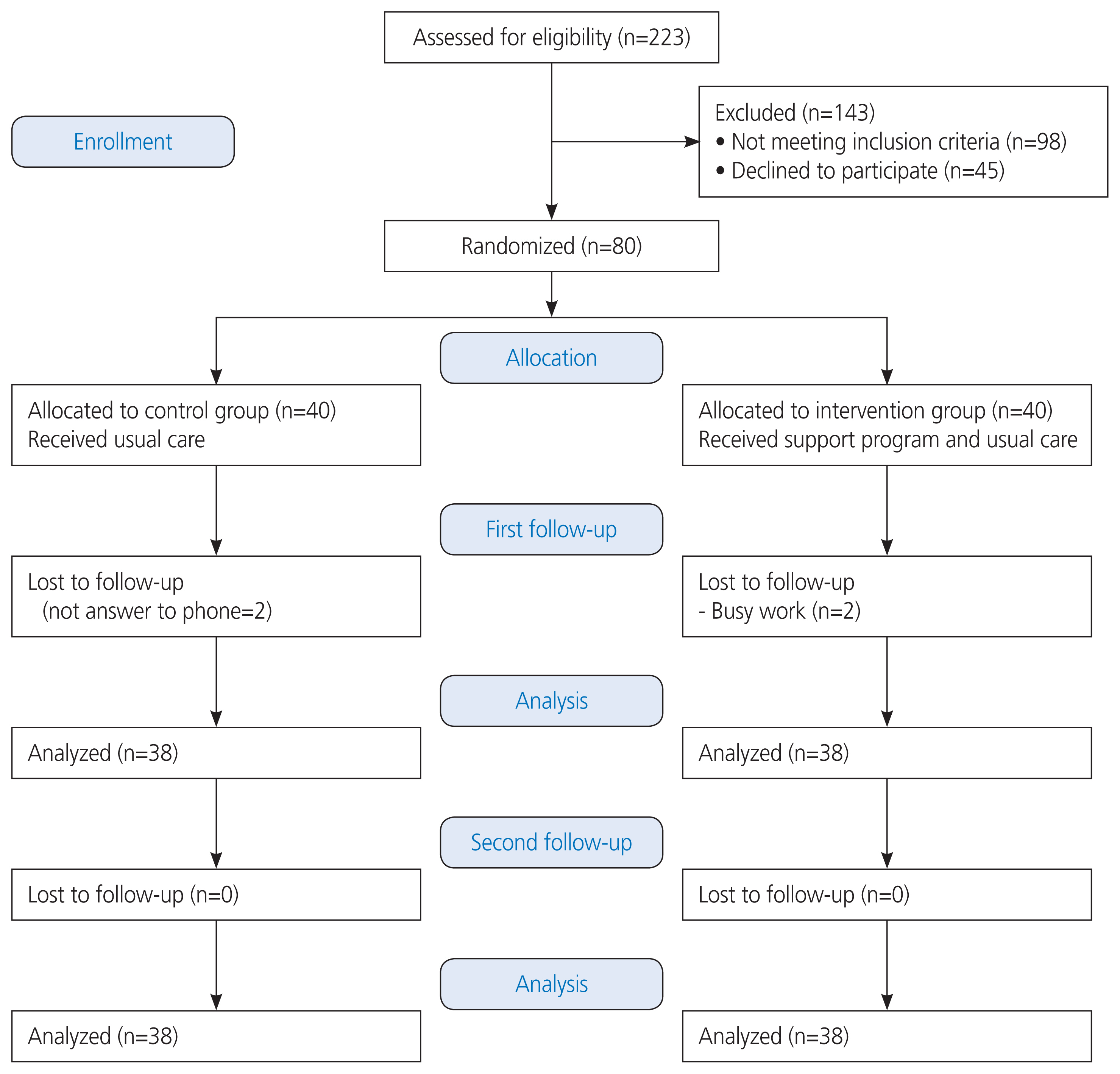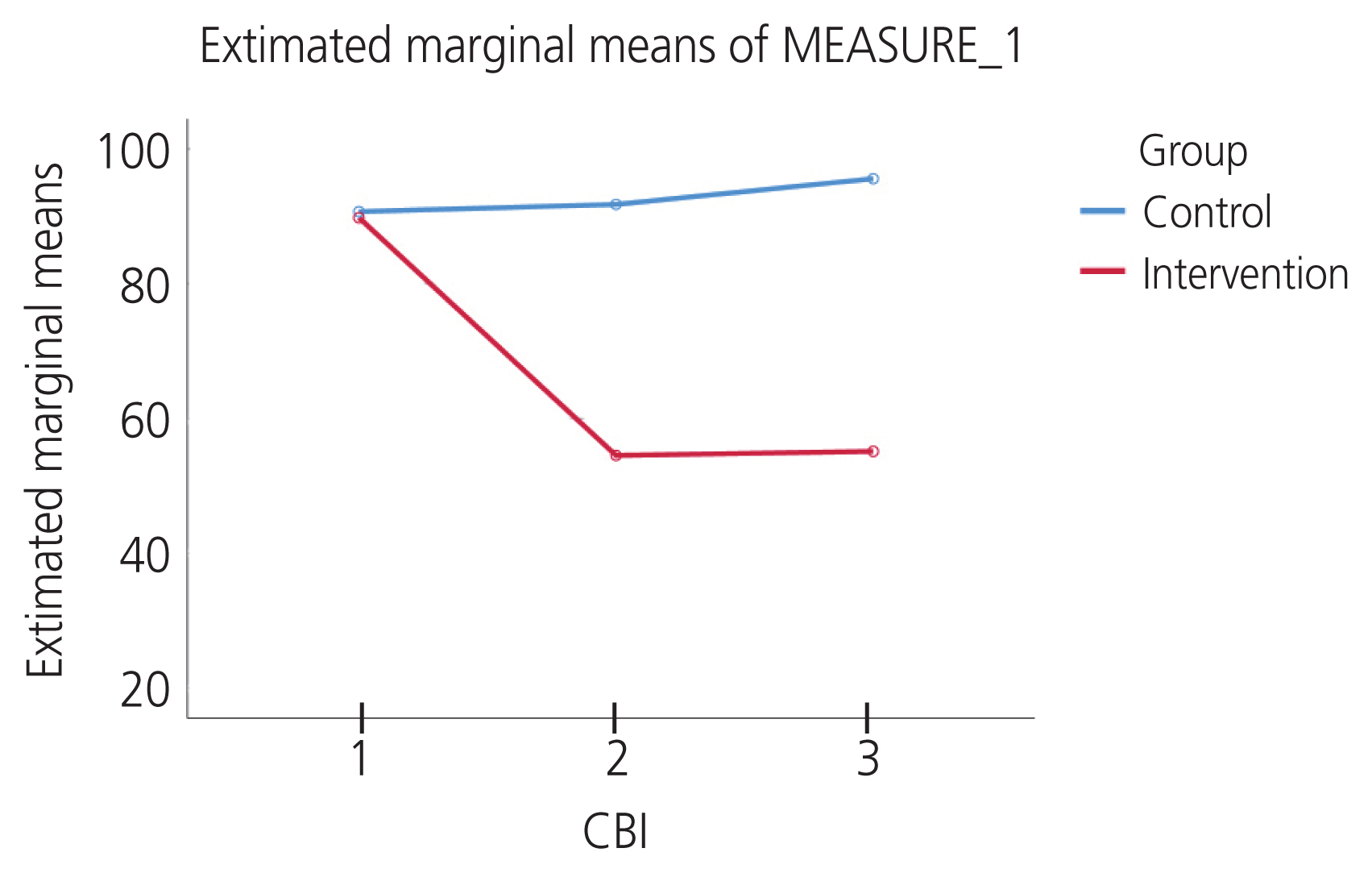Obstet Gynecol Sci.
2022 Sep;65(5):441-450. 10.5468/ogs.22080.
The effect of a support program on the burden of spouses caring for their partners with breast cancer: a randomized controlled trial
- Affiliations
-
- 1Sexual and Reproductive Health Research Center, Mazandaran University of Medical Sciences, Sari, Iran
- 2Psychiatry and Behavioral Sciences Research Center, Addiction Institute, School of Medicine, Mazandaran University of Medical Sciences, Sari, Iran
- 3Health Sciences Research Center, Institute of Traditional and Complementary Medicine, Mazandaran University of Medical Sciences, Sari, Iran
- KMID: 2533817
- DOI: http://doi.org/10.5468/ogs.22080
Abstract
Objective
This study aimed to determine the effect of a support program on burden of spouses caring for their partners with breast cancer.
Methods
This randomized controlled trial was conducted among spouses of women with breast cancer undergoing chemotherapy at a referral chemotherapy center in Iran. They were assigned to intervention (n=40) and control (n=40) groups using permuted block randomization. Three small group sessions lasted 45-60 minutes, followed by three telephone-based sessions, lasting 15-20 minutes (twice a week). The intervention sessions included defining stress management strategies in different situations: strengthening creativity, optimism, and management in planning, and defining the role of the caregiver. Primary outcome was care burden, and secondary outcomes were spouses’ stress, satisfaction with intervention, and partners’ quality of life (QOL). The caregiver burden inventory, depression anxiety stress questionnaire, World Health Organization QOL brief version, and client satisfaction questionnaire were completed before and after the intervention and at a 6-week follow-up.
Results
Thirty-eight participants in each group with a mean age of 44.24±9.01 years completed the study. Repeated measures analysis of variance showed a significant difference in the care burden (P<0.05; effect size, 0.70), stress (P<0.05; effect size, 0.64), and women’s QOL (P<0.05; effect size, 0.67) before and after the intervention.
Conclusion
The results of this study can be used to develop interventions, targeting the care burden and stress of spouses of women with breast cancer undergoing chemotherapy.
Figure
Reference
-
References
1. American Cancer Society. Breast cancer [Internet]. Atlanta (GA): American Cancer Society;c2022. [cited 2022 Jan 12]. Available from: https://www.cancer.org/cancer/breast-cancer/about/how-common-is-breast-cancer.html .2. Jazayeri SB, Saadat S, Ramezani R, Kaviani A. Incidence of primary breast cancer in Iran: ten-year national cancer registry data report. Cancer Epidemiol. 2015; 39:519–27.
Article3. Abbasi A, Shamsizadeh M, Asayesh H, Rahmani H, Hosseini SA, Talebi M. The relationship between caregiver burden with coping strategies in family caregivers of cancer patients. IJPN. 2013; 1:62–71.4. Safaeian Z, Hejazi SS, Delavar E, Hoseini Azizi T, Haresabadi M. The relationship between caregiver burden, and depression, anxiety and stress in family caregivers of cancer patients referred to Imam Reza Hospital in Bojnurd city. IJPN. 2017; 5:7–14.
Article5. Geng HM, Chuang DM, Yang F, Yang Y, Liu WM, Liu LH, et al. Prevalence and determinants of depression in caregivers of cancer patients: a systematic review and meta-analysis. Medicine. 2018; 97:39.6. Sajadian A, Heidari L, Mokhtari P. Investigating the care problems in family caregivers in patients with breast cancer. Iran J Breast Dis. 2015; 8:7–14.7. Hoellen F, Wagner JF, Lüdders DW, Rody A, Banz-Jansen C. Anxiety in caregiving partners of breast cancer patients. Arch Gynecol Obstet. 2019; 300:993–1005.
Article8. Nasiri A, Taleghani F, Irajpour A. Men’s sexual issues after breast cancer in their wives: a qualitative study. Cancer Nurs. 2012; 35:236–44.9. Awadalla AW, Ohaeri JU, Gholoum A, Khalid AO, Hamad HM, Jacob A. Factors associated with quality of life of outpatients with breast cancer and gynecologic cancers and their family caregivers: a controlled study. BMC cancer. 2007; 7:1–14.
Article10. Haj Mohammad N, Walter AW, van Oijen MG, Hulshof MC, Bergman JJ, Anderegg MC, et al. Burden of spousal caregivers of stage II and III esophageal cancer survivors 3 years after treatment with curative intent. Support Care Cancer. 2015; 23:3589–98.
Article11. Steptoe A, Hamer M, Chida Y. The effects of acute psychological stress on circulating inflammatory factors in humans: a review and meta-analysis. Brain Behav Immun. 2007; 21:901–12.
Article12. Li QP, Mak YW, Loke AY. Spouses’ experience of caregiving for cancer patients: a literature review. Int Nurs Rev. 2013; 60:178–87.
Article13. Morgan MA, Small BJ, Donovan KA, Overcash J, McMillan S. Cancer patients with pain: the spouse/partner relationship and quality of life. Cancer Nurs. 2011; 34:13–23.14. Jemal A, Bray F, Center MM, Ferlay J, Ward E, Forman D. Global cancer statistics. CA Cancer J Clin. 2011; 61:69–90.
Article15. Huang CY, Zane N. Culture and psychological interventions. Oxford University Press;2019. p. 468–506.16. Gabriel IO, Mayers PM. Effects of a psychosocial intervention on the quality of life of primary caregivers of women with breast cancer. Eur J Oncol Nurs. 2019; 38:85–91.
Article17. Novak M, Guest C. Application of a multidimensional caregiver burden inventory. Gerontologist. 1989; 29:798–803.
Article18. Shafizadeh A, Mirzaee A, Heravi-Karimooi M, Rejeh N, Sharifnia H, Montazeri A. The relationship between caregiver burden and anxiety and depression in caregivers of Alzheimer’s elderly. IJNR. 2020; 15:67–75.19. Mirsoleymani SR, Rohani C, Matbouei M, Nasiri M, Vasli P. Predictors of caregiver burden in Iranian family caregivers of cancer patients. J Educ Health Promot. 2017; 6:91.
Article20. Lovibond PF, Lovibond SH. The structure of negative emotional states: comparison of the depression anxiety stress scales (DASS) with the beck depression and anxiety inventories. Behav Res Ther. 1995; 33:335–43.
Article21. Sahebi A, Asghari MJ, Salari RS. Validation of depression anxiety and stress scale (DASS-21) for an Iranian population. J Iran Psychol. 2005; 1:36–54.22. Larsen DL, Attkisson CC, Hargreaves WA, Nguyen TD. Assessment of client/patient satisfaction: development of a general scale. Eval Program Plann. 1979; 2:197–207.
Article23. Karbalaee-Nouri A, Hosseini A, Hajebi A, Rafii H, Motevalian A. Independent and social living skills training for people with schizophrenia in Iran: a randomized controlled trial. Iranian Rehabil J. 2015; 13:84–8.24. Van Esch L, Den Oudsten BL, De Vries J. The World Health Organization quality of life instrument-short form (WHOQOL-BREF) in women with breast problems. Int J Clin Health Psychol. 2011; 11:5–22.25. Nejat S, Montazeri A, Holakouie Naieni K, Mohammad K, Majdzadeh SR. The World Health Organization quality of life (WHOQOL-BREF) questionnaire: translation and validation study of the Iranian version. sjsph. 2006; 4:1–12.26. Isikhan V, Güner P, Kömürcü S, Ozet A, Arpaci F, Oztürk B. The relationship between disease features and quality of life in patients with cancer--I. Cancer Nurs. 2001; 24:490–5.
Article27. Massie MJ. Prevalence of depression in patients with cancer. J Natl Cancer Inst Monogr. 2004; (32):57–71.
Article28. Musarezaie AM-GT, Gorji M. Survey the anxiety and depression among breast cancer patients referred to the specialized Isfahan hospital of cancer, Iran. HSR. 2015; 10:39–48.29. Purkayastha D, Venkateswaran C, Nayar K, Unnikrishnan UG. Prevalence of depression in breast cancer patients and its association with their quality of life: a cross-sectional observational study. Indian J Palliat Care. 2017; 23:268–73.
Article30. Zainal NZ, Nik-Jaafar NR, Baharudin A, Sabki ZA, Ng CG. Prevalence of depression in breast cancer survivors: a systematic review of observational studies. Asian Pac J Cancer Prev. 2013; 14:2649–56.
Article31. Badger TA, Segrin C, Sikorskii A, Pasvogel A, Weihs K, Lopez AM, et al. Randomized controlled trial of supportive care interventions to manage psychological distress and symptoms in Latinas with breast cancer and their informal caregivers. Psychol Health. 2020; 35:87–106.
Article32. Bahrami M, Farzi S. The effect of a supportive educational program based on COPE model on caring burden and quality of life in family caregivers of women with breast cancer. Iran J Nurs Midwifery Res. 2014; 19:119–26.33. Walsh K, Jones L, Tookman A, Mason C, McLoughlin J, Blizard R, et al. Reducing emotional distress in people caring for patients receiving specialist palliative care. Randomised trial. Br J Psychiatry. 2007; 190:142–7.34. Northouse L, Kershaw T, Mood D, Schafenacker A. Effects of a family intervention on the quality of life of women with recurrent breast cancer and their family caregivers. Psychooncology. 2005; 14:478–91.
Article
- Full Text Links
- Actions
-
Cited
- CITED
-
- Close
- Share
- Similar articles
-
- Relationship between Caring Burden and Caring Behavior among Family Caregivers of Elderly with Dementia in Community-Dwelling: Mediating Effects of Caring Self-Efficacy and Social Support
- The Elderly Spouses' Experiences of Providing Care for their Bedridden Patient at Home
- Effect of Intervention Programs for Improving Maternal Adaptation in Korea: Systematic Review
- Caregiver's Burden and Quality of Life of Male Spouses with Stroke Wives
- Husbands' Caring Experiences for Women with Breast Cancer in Korea



